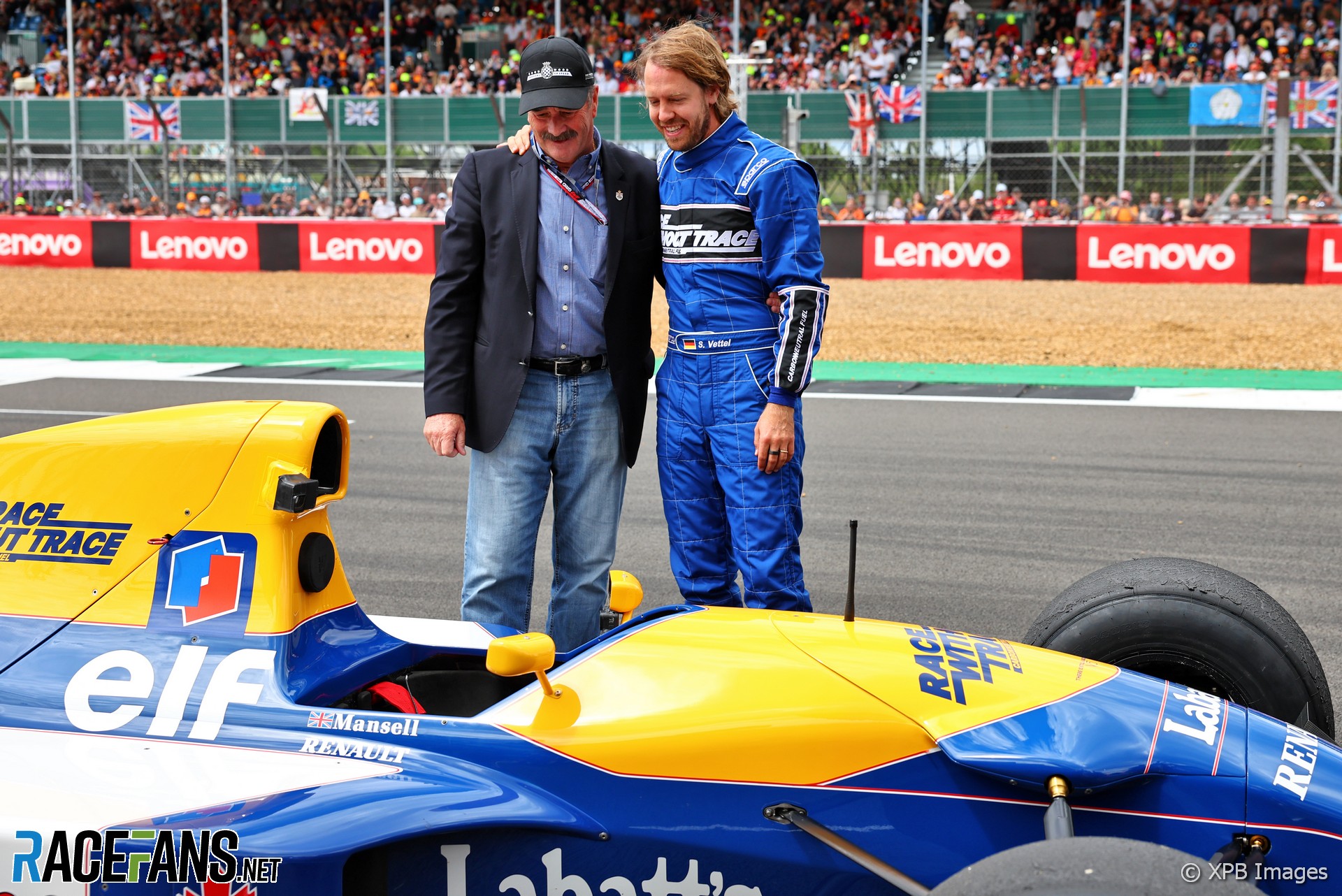Sebastian Vettel said his run in Nigel Mansell’s Williams-Renault FW14B was inspired by nostalgia but showed his focus on the problems of the future.
The four-times world champion owners the example of the 1992 title-winning car which he took out on track at Silverstone ahead of the British Grand Prix. Mansell was on hand to watch the run and greeted Vettel on his return.Vettel, who sported a specially-designed helmet in Mansell’s style for the run, said “it was very special to have him there awaiting me at the end.”
The experience brought back childhood memories for the Aston Martin F1 driver. “The sound, it was… I felt like a five year old again because the sound, everything just brought me back to 30 years ago.”
The car ran on a a specially-produced sustainable fuel. Vettel said he was keen to highlight the need to embrace new environmental technologies.
“Doing it the way that we did it, with carbon neutral fuels, trying to showcase that the emotions can be great but we can do it in a more responsible way, was very, very important to me.
“When I came up with the idea that 30 years ago Nigel won the grand prix [at Silverstone] – obviously, I’ve got the car from that that time and that very car – I didn’t want to do it and just waste resources and thought of a better way of doing it.

The petrol Vettel used to power the car’s 3.5-litre V10 Renault engine was supplied by P1 Fuels and made using a mix of biological and synthetic fuels. A percentage comes from bioethanol from non-feed stocks and another from methanol synthesised out of captured CO2 from the air and hydrogen generated by electrolysis from non-drinkable water.
Using bioethanol means that the petrol replacement is more easily generated than relying on the synthetic fuel alone. Vettel said the fuel cost €5.95 per litre (£5.09).
Vettel said that he hoped projects like his ‘Race Without a Trace’ initiative would push F1 towards moving to sustainable fuels on a faster timeline. “I’m not taking decisions here, but I can ask questions and the plan is to to move in that direction.
“There’s pros and cons also when you talk about synthetic fuels, how are you doing them and what’s the source and so on. But we have no time to waste, no time to wait.
“Obviously the introduction is planned for 2026, I understand that not everybody’s easily agreeing on changing it sooner but in the end that’s probably going to be the right call, to do it sooner.”
Advert | Become a RaceFans supporter and
Advert | Become a RaceFans supporter and
2022 F1 season
- Mercedes told me “you’re wrong” about 2022 car’s problems – Hamilton
- FIA confirms all 10 F1 teams complied with 2022 cost cap
- Steiner “not ashamed” of panning “slow” Schumacher in Drive to Survive
- Albon believes year out of F1 improved him as a driver
- Hamilton sees diversity gains in F1 years on from his ‘traumatising’ experience of racism


























Jere (@jerejj)
6th July 2022, 13:08
Correct me if I don’t get something, but did they simply put a different fuel type in the car without changing anything or change something so the engine could stand a different fuel type than originally used for the car back in the day?
Since the engine got built & designed for a certain fuel type, would using a different one require some alteration for the engine to work?
For example, a petrol-engined road car can’t work with diesel & vice versa, so what about different racing fuel types in a racing car, if this makes sense.
Proesterchen (@proesterchen)
6th July 2022, 13:23
AMuS reported that Renault shared their fuel formula with the company Seb had found to make the fuel for the run, and they then produce a tailor-made brew for the old lump. (the engine, not Seb 😝)
bosyber (@bosyber)
6th July 2022, 14:46
Ah, missed that article, makes sense (and I guess with any commercial or competitive advantage long retired, mostly Renault helping generate positive news) thanks @proesterchen
Proesterchen (@proesterchen)
6th July 2022, 13:20
One of Formula 1’s most iconic and (in some aspects) technologically advanced cars, no wonder it got Seb & probably most of the 140,000 people in the grandstands by the feels! ❤
SjaakFoo (@sjaakfoo)
6th July 2022, 13:33
So emissions are the same as with traditional fuels, or are those also improved?
BasCB (@bascb)
6th July 2022, 19:48
My guess is that there are far less things like benzene etc in there, possibly also lower amounts of particles, although that is probably more to do with the motor management
alex capps
7th July 2022, 13:42
The emissions are similar but it has one important difference the source of the carbons. in normal fuel we are burning hydrocarbons that have been “trapped” underground thus every bit of CO2 that gets released is CO2 that wasn’t previously there. In synthetic fuel they harvest or capture carbons in the air then use those to create a fuel. so rather than adding carbon to the air think of it as having two buckets and just moving water back and forth between them. Nothing new is getting generated (there will be some but I’m oversimplifying this). the tricky bit is these processes are very energy intensive so it will require lots of investment in wind and solar to really do it sustainably.
Sensord4notbeingafanboi (@peartree)
6th July 2022, 13:38
Sustainably fuelled fw18b that is the most novel excuse for being slow I have ever heard.
Carbonized
6th July 2022, 14:07
Synthetic fuel is one of ,if not the most inefficient fuel by “energy at the wheel” metric. Hydrogen cost a lot of energy to produce, co2 cost a lot of energy to capture and store, treating and processing the two cost a lot of energy. Overall Synthetic fuels only return between 6 and 18% of the energy you put in to produce it. Abysmal inefficiency. Not to mention that what comes out the exhaust pipe is not too green. And that what the next F1engine is going to run on with the label “Green”
S
6th July 2022, 14:33
Why worry so much about efficiency when the energy is free and plentiful, provided by nature?
Even if it were only 1% efficient, that energy would otherwise just be completely wasted anyway.
And of course the next fuel F1 (and the rest of the world, for that matter) uses will not be perfect.
But it will be better than the current one, and it is that progress which is the important part.
bosyber (@bosyber)
6th July 2022, 14:52
Well S, with such a lack of efficiency, and with cheap ‘free’ energy not being nearly realistic (at all ever really, conversion losses, wear transport etc.), even the argument for it over Hydrogen remains very weak for any foreseeable future.
Apart from small niches like this demo, or 20 something F1 races a year.
S
6th July 2022, 15:02
The sun isn’t free?
André
6th July 2022, 18:05
It is, but most of the electricity available today doesn’t come from the sun, nor from wind. The more we shift towards electrification, the more demand for electricity we create and renewables can’t keep up at the required rate to replace coal, gas and nuclear. So most of the electricity used to convert CO2 to methanol, and to produce bioethanol won’t come from renewable clean sources. Conversion efficiency is very important. You can synthesize biofuels in a pilot scale with renewables and live with the low conversion efficiency, but to do it on a global scale, we’re pretty far. By the way, Brazil has been producing bioethanol from sugar cane for decades, the automobiles have flex engines that can run any mixture of ethanol and gasoline, but somehow adding 10% of bioethanol to the fuel in F1 is a 21st century novelty. You know why? Petrochemical industry lobby. The technology is only acceptable if they control it. The current buzz about biofuels is happening because the giants like Shell and others entered the business. Now it’s “cool” to do it. Before, they tried everything they could to suppress existing alternatives to fossil fuels. You need to realise that this is all manipulation.
AlanD
6th July 2022, 21:55
Andre: “most of the electricity available today doesn’t come from the sun, nor from wind”
I don’t know which country you live in Andre, but here in UK, the latest figures put our energy generating capacities at:
Renewables, 38.2 TWh
Fossil Fuels, 30.8 TWh
Nuclear, 12.5 TWh
and the amount and proportion of renewable energy we are generating increases each month. It is a mistake to think that renewable energy isn’t cost effective or that consumers don’t want it.
S
7th July 2022, 2:49
Indeed, André.
However, that’s not the point, is it… This fuel wouldn’t be going into mass production tomorrow for immediate replacement of all existing petrol supplies.
It is currently a low volume product for low volume purposes. It’s essentially a development product – a prototype… To scale up, the process needs a lot more refinement and infrastructure, which takes time and money. That doesn’t make it useless, though – it just means it isn’t ready yet. But nothing else is either.
If it were upscaled to mass production, it would be rather pointless and completely undermine its purpose to use dirty power to create it, wouldn’t it…
Ethanol is also produced in Australia using excess (inedible) sugarcane product and can be purchased by the public for personal use in an E85 blend. It’s also used in the Aussie Supercars racing series.
I agree that F1 should be at the forefront of this – but F1 is a marketing business more than a technological or ecological one. They’ll do whatever makes them money. F1 is a follower, not a leader.
Now that the environmental movement and public pressure is moving in that direction, renewables are starting to become the latest money-maker. It would cost ‘F1’ money to not go in that direction.
Jere (@jerejj)
6th July 2022, 14:54
@bullfrog What? Nothing he could’ve done differently to avoid rear-ending Albon.
Sonny Crockett (@sonnycrockett)
6th July 2022, 17:53
£5 litre?
About the same as our local Shell garage…
Griffin
6th July 2022, 18:39
Seb should glue himself to his Aston until F1 agrees to fast-track sustainable fuels…
Markus (@)
6th July 2022, 22:39
Stories about sustainable, green fuel are similar to stories about green electric cars. In both cases, the production of either the fuel itself or the batteries is more harmful to the environment than modern hybrid, turbo diesel or petrol engines.
AlanD
7th July 2022, 0:21
Markus, your views on sustainability are held by many, but not backed up by current research and technology. The production of biofuels is eco-friendly if you are using the right biomass. If woodland is cut down to grow corn which is used to make ethanol, that is a bad choice for the environment, but there have been too many examples of this due to better market prices for fuel product than for food product. In Europe, the licensing regulations require the biofuel manufacturer to demonstrate that the production is not a net negative to the environment. As regards batteries, it is possible to make 100% recyclable lithium batteries, but again it requires governments to create the right legal framework to require it, and the infrastructure to handle it.